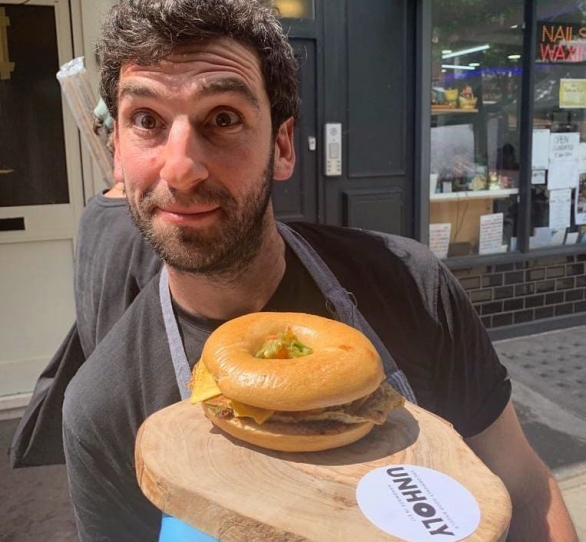Whilst hospitality is one of the industries worst affected by the Covid-19 pandemic, a Leyton-based entrepreneur has revealed how he has used lockdown to re-shape his Unholy Bagels business to bring a little piece of New York to London.
Unholy Bagels, a name which reflects the initial period when Martin Frimet started to bake the bagels and struggled to create the infamous holes in the middle, was founded in August 2018. For the first 18 months Martin began by taking his bagels to markets. Then, in March 2020, he took over a kitchen in a café and moved his business there. Unfortunately, that was when the pandemic struck the country and people went into national lockdown, closing the café.
“I always enjoyed making sandwiches when I was younger, experimenting with different flavours and combinations of fillings and this passion for tasty food continued as I got older,” Martin said. “New York style bagels are bigger than traditional ones with a more malty flavour, due to the malt and sugar they use in the baking process: they are chewier on the inside with a crispy outside. I had no business plan developed, it just simply felt right for me at that time to start selling my bagels at markets and the feedback from customers seemed to agree.”
It was a combination of the discovery of New York style bagels on a trip to the Big Apple, a love of baking and a Jewish upbringing that led to Martin’s business idea in the first place. So he set out to perfect the recipe, making bagels for his colleagues at his day job, working for Amazon. “I knew that I did not want to stay working in marketing and project management in a corporate business forever, and I enjoyed baking bagels at home, so when I was offered redundancy it was the push I needed to take a different path,” Martin revealed.
However, despite the initial success of Unholy Bagels, with lockdown hitting Martin decided to use this period to dedicate more time to his business structure and, as part of this, participated in a Building Business Resilience online workshop organised by the award-winning YTKO Outset Waltham Forest business start-up service for people living in deprived communities or facing additional disadvantages and barriers.
“The workshop helped me in terms of understanding the basic principles of sales and marketing time and who my customers are,” he explained. “It made me think about what my goals were and what the customer journey was. The examples given, and the exercises, were really helpful and made me stop and consider the processes involved in my own business which I never had time to do before. It helped me to reframe my business and I am working with some friends who are non-executive directors to develop plans to obtain a bigger premises and maybe expand to additional cafes.”
Martin added: “A big change for me is that I now think more about the long-term and I spend time planning my time more effectively, which has made a real difference. I now have a target in mind when I plan and create campaigns to help me reach it. Thanks to the Outset workshop, I definitely know my business better and have a more detailed plan for its growth.”
Unholy Bagels, and its meat-free menu, is now back trading after restrictions eased. Long term Martin is keen to develop his cafes as social spaces which can benefit the community in which they operate. “I just want to offer tasty fillings that delight the customer without jumping on the current bandwagon for plant-based eating so that it does not even become an issue that people think about,” he said. “My friends and I enjoy spending time thinking of names for the fillings which bring a smile to people’s faces such as Cinco de Egg Mayo, Peas & Felafel and Alt Beef which features a vegan salt beef.”
Martin is one of over 22,000 businesses and nearly 31,000 disadvantaged entrepreneurs to have been supported by YTKO over a 14-year period. Analysis of 36 funded programmes across the South West, South East, London, East of England and Midlands, published in March 2021, showed YTKO assisted 30,752 entrepreneurs (including 47% who were previously out of work, 44% in receipt of benefits and 27% with entry-level qualifications), and 22,508 growth-ambitious businesses. It also revealed that 51% of those supported by YTKO were female entrepreneurs and 20% Black, Asian and Minority Ethnicity (BAME), compared to national averages of an estimated 23% and 5% respectively. Overall, YTKO’s performance delivered a ‘conservative’ net impact of £282 million GVA, a £362 million triple bottom line impact and a ROI of £10.70 for every £1 invested.
“We are incredibly proud of achieving such high levels of both improved productivity and job creation, increasing the competitiveness of the UK economy during the longest period of economic uncertainty in the UK,” said YTKO Group CEO Bev Hurley CBE. “It also robustly demonstrates that financial and social exclusion can be overcome, and therefore how we are impacting directly on the levelling up agenda and left-behind places, pioneering a more inclusive economy. I am so proud that, as an SME ourselves, our teams have delivered such a major impact through our social mission.”




